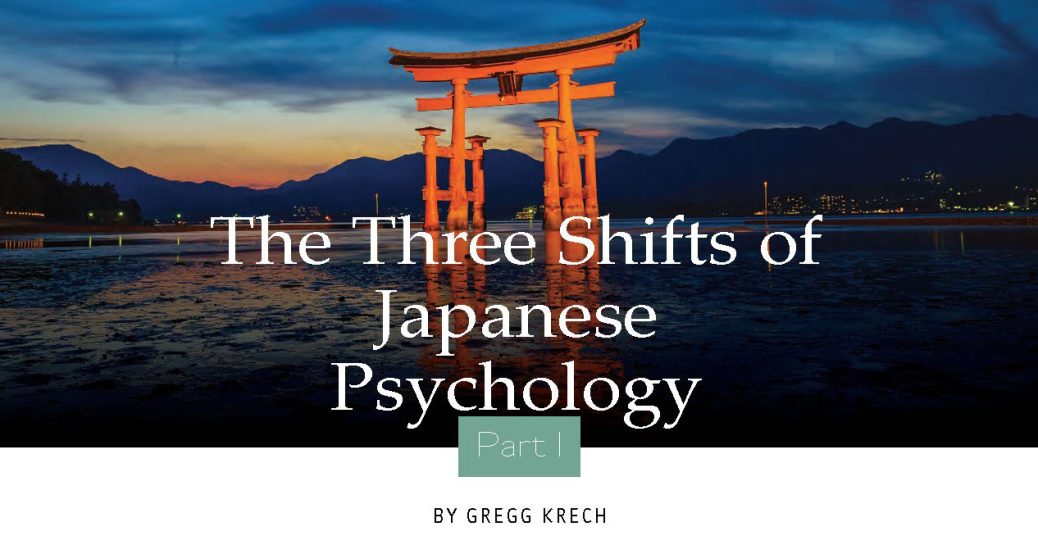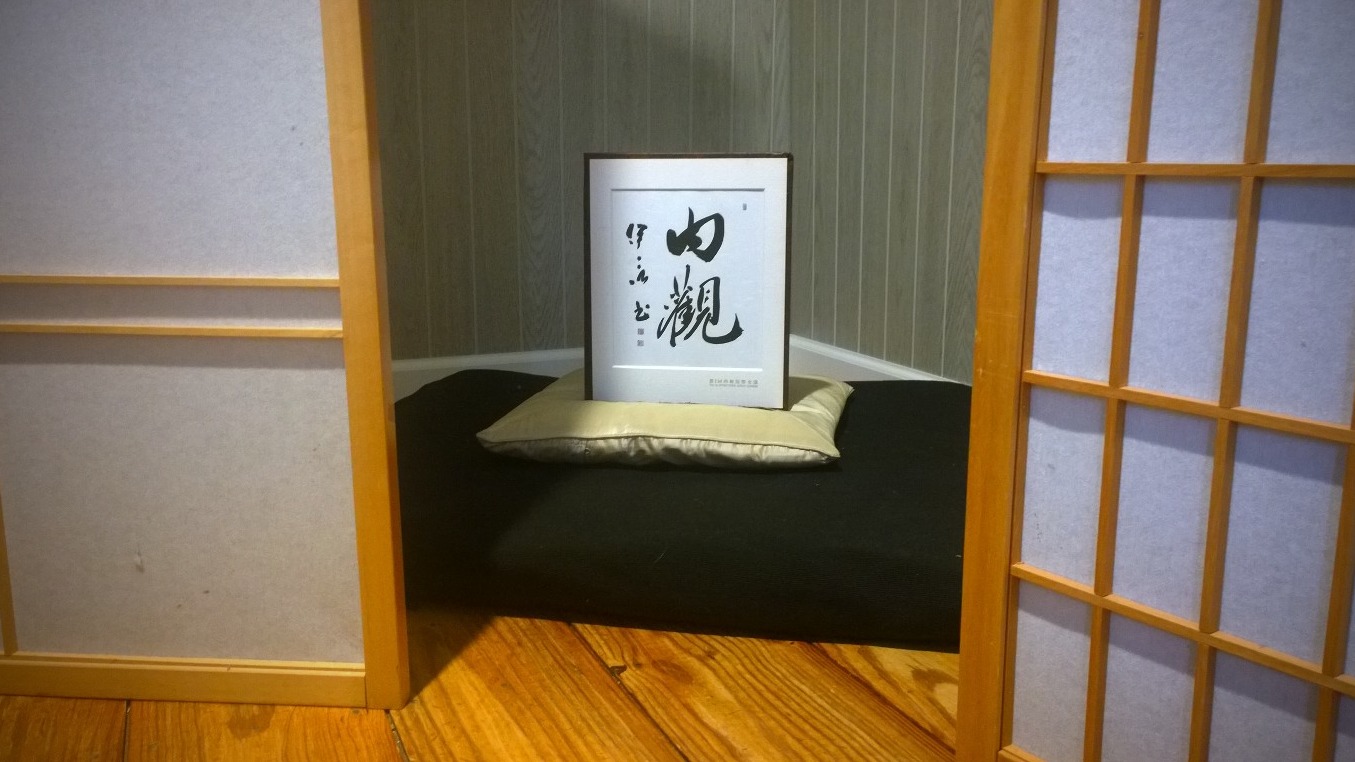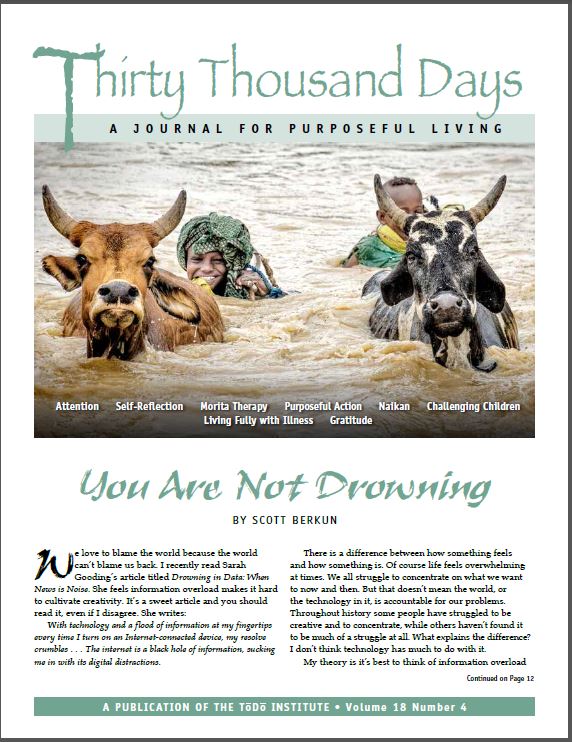The Three Shifts of Japanese Psychology — Part I
by Gregg Krech
The most common question I’m asked is “What is Japanese Psychology?” Underlying that question, is a curiosity about how Japanese Psychology differs from Western Psychology.
At the heart of Japanese Psychology, there are three shifts you are encouraged to make. These shifts are also what distinguish Japanese Psychology from other approaches to mental health. Let’s take a look at the first of these shifts:
From a Feeling-Centered Life to a Purpose-Centered Life
The Feeling-Centered Life
Think of your life as a theatrical play. Who is the director of that play? For many of us, it is our feelings. We open the door to the refrigerator and ask ourselves the question, “What do I feel like eating?” In our relationships, we may respond (in words and actions) to other people based on how we feel (i.e. angry, resentful, frustrated, disappointed), rather than to the needs of the situation. Advertisers count on us to make impulsive purchases based on feelings we have in response to marketing campaigns and ads. For people who struggle with addictions like drugs, alcohol, sex, and gambling, there is an intense drive to recreate the feeling-states associated with these activities. We may avoid tasks that stimulate aversion or feelings of discomfort (like doing taxes) and gravitate towards activities that stimulate comfort or pleasure (like watching a movie), even though the taxes need to be done.
What does the director do? He decides what’s going to happen and how it will be done. The director supervises the photography, and sets up the scene. Most important, she tells the actors how to handle the dialogue. The director has a lot of authority in your play.
There are several serious problems with a Feeling-Centered approach to life.
First, our feelings don’t necessarily point us in the direction of wise, healthy or responsible choices. When we avoid doing something we don’t feel like doing (procrastination) there are often consequences. There are also consequences when we fail to exercise “restraint”. Restraint often means that we keep ourselves from acting based on our feeling state. An absence of restraint is usually involved in addictions, infidelity, and violence.
Director: “OK, when we start Alan is walking into the kitchen and notices three cinnamon rolls on a plate. He hasn’t had a cinnamon roll in weeks. He feels a craving for something sweet. So he eats one, walks out of the kitchen, and then comes back for a second one. Ready . . . Action!”
Second, our feelings are constantly changing. You can crave chocolate, but if you eat enough chocolate, you will stop because you will get to a point where you’ve eaten so much that you have an aversion to it. At least for a few hours or days. In our intimate relationships we can feel the sweetest love for our partner one moment. And then something happens and we feel a surge of anger or a deep disappointment. In Japanese Psychology, we acknowledge that feelings “change like the weather.”
Director: “OK, Sarah, you come home tired after a rough day at work. You notice that Larry has put a bouquet of roses on your bedroom dresser. You smile at Larry and give him a big hug and thank him. Then he says he has some bad news. He has to work late Thursday night and he won’t be able to go to the Norah Jones concert with you. You have 4th row seats that you purchased months ago. Norah Jones is your favorite vocalist. Your feeling here is disappointment which morphs into anger. Lots of anger. You remember the last time he did this. Now you’re really ANGRY. So just let all that anger out like you were firing a cannon at him.”
So when feelings are the director of our life’s play, we get into trouble. We get into trouble with relationships, with our health, with money and with, well, just about everything. I lived the first 30 years of my life with my feelings in charge. It didn’t work out so well.
The Purpose-Centered Life
So what does it look like if you fire the current director (your feelings) and hire a new director (purpose). The first thing you’ll notice is that the feelings-director doesn’t leave the company altogether, he/she just leaves that job. Your feelings will now become one of the many characters in the play. Some people think that you lose your feelings, but that isn’t true at all. It’s simply that your feelings aren’t running the show any more.
You probably have various roles in your life. For me, I am a husband, a father to my two daughters, a musician in a band, a writer, a teacher, a friend and more. With PURPOSE as the play’s director, I am pointed towards what I need to do to support or accomplish my purposes. For example, in my marriage my purpose is to be a good husband and cultivate a healthy and loving marriage. When my wife does something that irritates or disappointments me, my feelings want to immediately let her know. If my feelings are running the show, it goes something like this . . .
Feelings: “OK. Scene One, Take One.
Gregg is upset about something Linda didn’t do. OK, Gregg, let her have it. Criticize her. Let her know she messed up, she didn’t do something you expected her to do.”
OK, ready . . . ACTION!
(Gregg approaches Linda and lets her know he is disappointed.)
Feelings: “CUT!! No, no, no! I’m looking for more drama, more feelings, more anger and disappointment. How dare she not meet your expectations. You need to get through to her in a big way. I want more rage! You’ve had it! You’re not going to take it anymore. Come on, Gregg. You need to really feel those feelings of anger. What’s your inspiration here? Maybe a time you were beaten up by a bully when you were a kid. Find your inspiration and then act on it. OK? Let’s try it again.”
But with my PURPOSE as the director, it goes something like this.
Purpose: “OK. I know you are upset and angry. You have lets of feelings right now. They are not pleasant feelings and they are pushing to come out and get expressed. But let’s just take a breath for a moment. Think about your purpose. Is expressing those feelings while they are fully charged going to help you have a good marriage? Yes or No? I mean, you’ve tried that in the past, right? Many times. How did that work out for you? Did you enjoy sleeping alone on the sofa? So let’s just pause and let things settle down. Take a short walk on the road. Try to do some self-reflection – Is there any way you contributed to the problem you are so upset about? What did you receive from her this past week? Let’s just cool off for 24 hours before you say something. Actually, 48 hours. Then, if it’s still important, maybe you invite her to have a conversation. Or maybe not. Let’s just leave that open-ended, for now.”
Meanwhile, take a walk. Get your body moving. Chop some firewood. Or just play some blues on the piano.”
So your purpose takes you in a different direction. It’s not just about relationships. It’s about food cravings. And spending money. And getting exercise. And doing the taxes. And even making sure you set aside time to read or go to a concert.
I still have feelings. I still have fun. At times, I’m spontaneous. But my life isn’t such a roller coaster, the way it was when my feelings were always running the show.
The shift to a purpose-centered life takes practice. We’ve built up habits over the years and we don’t change those habits instantaneously. But most of us start with at least some capacity for self-discipline. And you consciously build on that foundation. What is self-discipline, anyway? It’s about feeling like you want to do something, and not doing it (restraint). Or it’s about feeling like you don’t want to do something, and doing it anyway (taking action). In both cases, we are able to feel what we’re feeling (maybe that’s what feelings are for) and respond to life in a more purposeful way.
That’s the first shift that Japanese Psychology is encouraging you to make.
Stay tuned for Part II:
The Shift from Self-focused Attention
to Attention/Engagement to the World Around Us.
Gregg Krech has been studying and teaching Japanese Psychology for 32 years. He is the author of five books on Japanese Psychology including, The Art of Taking Action: Lessons from Japanese Psychology and is the Director of the ToDo Institute, a non-profit organization which furthers the development and application of Japanese Psychology in the west. He currently lives in Vermont where he enjoys baking sourdough bread, cycling, and playing blues on the piano.
www.thirtythousanddays.org
Tags: Acceptance Action Getting Things Done Mental Wellness Morita Therapy Purpose Taking Action













